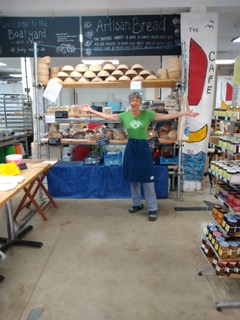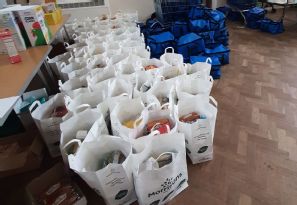News
'Emma's Bread' during COVID-19 - an interview by Becca McGowan, Warwick Crop Centre
 Emma Parkin (pictured left) is passionate about food and its connection to the environment. Therefore in 2004 she took up baking as a career to make bread in an ethical and ecologically responsible way. From originally using premises at Shillingford Organics in Exeter, to then baking in the Real Food Store in central Exeter, she now has her own premises including a bakery and café along Exeter Quay named the Boatyard Bakery & Café (pictured left). During the COVID-19 crisis, Emma has witnessed a lot of neighbouring businesses along the quay forced to close. As bread is a staple food item, the bakery part of her business has remained open but not without canny adaptations in the ways they operate.
Emma Parkin (pictured left) is passionate about food and its connection to the environment. Therefore in 2004 she took up baking as a career to make bread in an ethical and ecologically responsible way. From originally using premises at Shillingford Organics in Exeter, to then baking in the Real Food Store in central Exeter, she now has her own premises including a bakery and café along Exeter Quay named the Boatyard Bakery & Café (pictured left). During the COVID-19 crisis, Emma has witnessed a lot of neighbouring businesses along the quay forced to close. As bread is a staple food item, the bakery part of her business has remained open but not without canny adaptations in the ways they operate.
PhD student, Becca McGowan from the School of Life Science's, Warwick Crop Centre speaks to Emma to discuss how the business has been rising to the challenge! More information
Warwick developing a utility decision support tool to evaluate the efficacy of different stochastic countermeasure strategies to COVID 19 including health risk to the population
 Professor Jim Smith, from the Department of Statistics and one of the Food GRP leads , is heading a team of researchers from Warwick University and the Alan Turing Institute in developing a fast multiattribute utility decision support tool. This is designed to enable the general public to evaluate the efficacy of different stochastic countermeasure strategies to COVID 19.
Professor Jim Smith, from the Department of Statistics and one of the Food GRP leads , is heading a team of researchers from Warwick University and the Alan Turing Institute in developing a fast multiattribute utility decision support tool. This is designed to enable the general public to evaluate the efficacy of different stochastic countermeasure strategies to COVID 19.
One critical issue at the current time is to balance in a rational way the short term health risks to the population - both directly and indirectly caused by COVID 19 against the usually more long term health risks caused by countermeasures. In particular the medium and long term effects of poverty and destitution can be expected to dramatically decrease life expectancy in the general population. The imposition of severe countermeasures can therefore be seen as exacerbating long term health outcomes.
Food poverty - as witnessed for example through the increased use of food banks - has been shown to be one of the more sensitive indicators of how poverty is increasing in the general population. Dr Martine Barons, also a Food GRP lead from the Department of Statistics and Jim are currently using the broad expertise of the Warwick Food GRP to develop simple food measures of poverty and so indicators to determine this and other deleterious effects of COVID 19 to set these against the more immediate health risks.
Interview with Fatma - The Founder of Shillingford Organics Farm School - by Becca McGowan, Warwick Crop Centre
 Fatma Sabet (pictured) is the founder of Shillingford Organics Farm School. Farm School is a social enterprise which runs sessions for kids in its miniature version of Shillingford Organics. At the school, children and their parents or school teachers learn how to grow, care for, harvest and cook produce. They also get the opportunity to observe the practises taking place on the farm and learn about the nature which supports the farm’s agricultural activities. If Farm School is not enough to keep her busy, Fatma is also in her first year of a PhD at the University of Exeter. An aim of her PhD is to create an intervention in the school food system to optimise healthiness and sustainability. In the light of the novel Coronavirus pandemic, like most schools and extracurricular clubs, Farm School has been forced to close.
Fatma Sabet (pictured) is the founder of Shillingford Organics Farm School. Farm School is a social enterprise which runs sessions for kids in its miniature version of Shillingford Organics. At the school, children and their parents or school teachers learn how to grow, care for, harvest and cook produce. They also get the opportunity to observe the practises taking place on the farm and learn about the nature which supports the farm’s agricultural activities. If Farm School is not enough to keep her busy, Fatma is also in her first year of a PhD at the University of Exeter. An aim of her PhD is to create an intervention in the school food system to optimise healthiness and sustainability. In the light of the novel Coronavirus pandemic, like most schools and extracurricular clubs, Farm School has been forced to close.
PhD student, Becca McGowan from the School of Life Science's, Warwick Crop Centre interviews Fatma to understand how Covid-19 has affected Farm School and its pupils and her thoughts on its implications for the diets of children.
Spotlight on how we're helping people access food through COVID-19
 Doing the weekly shop, or putting in your regular online delivery order, was something most of us took for granted until the COVID-19 crisis hit. Since the social distancing ‘lockdown’, something as basic as going shopping, or popping to the chemist to pick up a prescription, has become increasingly difficult to navigate for vulnerable and elderly people, as well as those who have found themselves in financial difficulty due to a reduced income.
Doing the weekly shop, or putting in your regular online delivery order, was something most of us took for granted until the COVID-19 crisis hit. Since the social distancing ‘lockdown’, something as basic as going shopping, or popping to the chemist to pick up a prescription, has become increasingly difficult to navigate for vulnerable and elderly people, as well as those who have found themselves in financial difficulty due to a reduced income.
Thankfully, dozens of community support initiatives have quickly sprung into action to support these groups, and many of our students and staff have been getting involved to help get food and assistance out to where it’s most needed.
